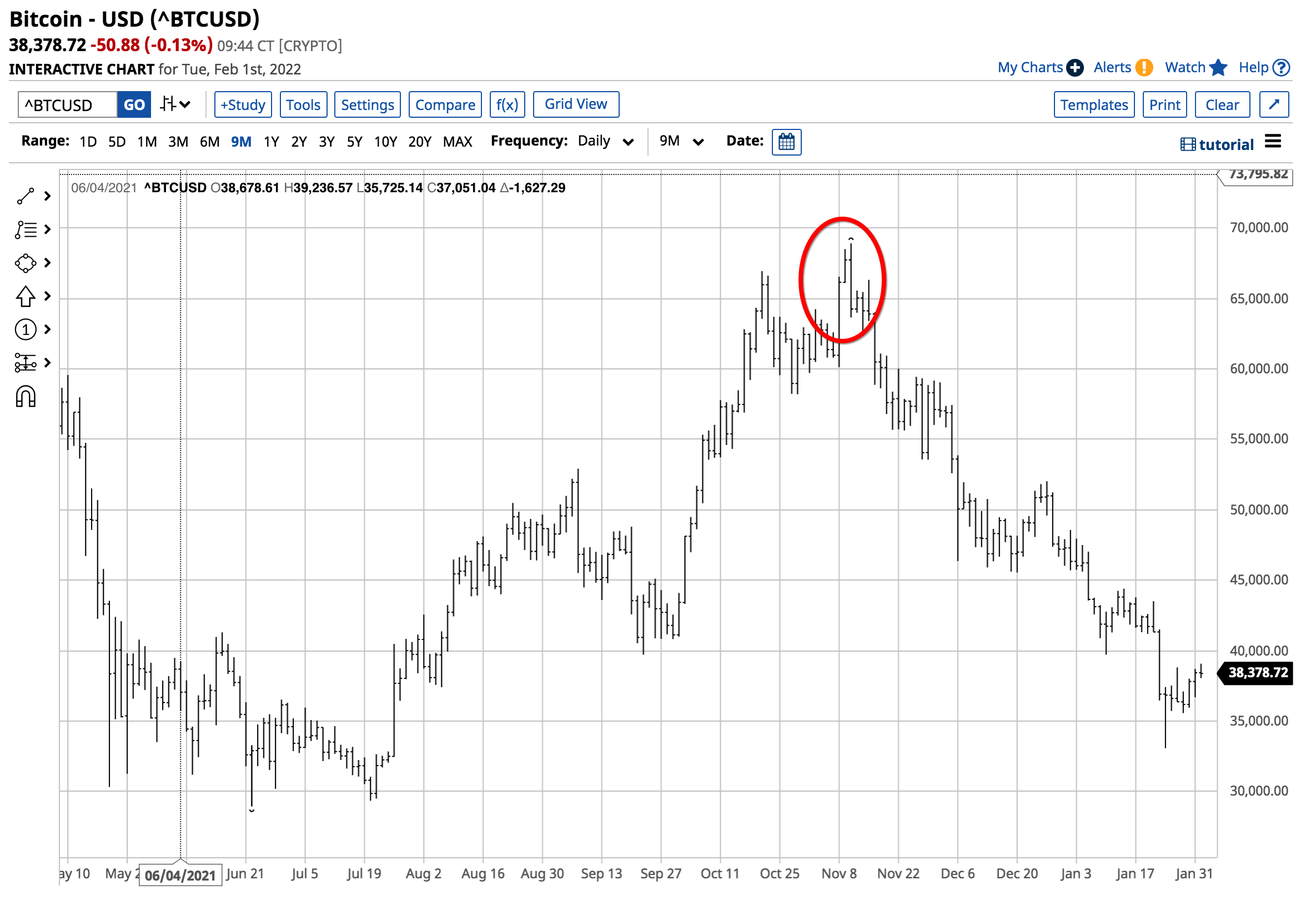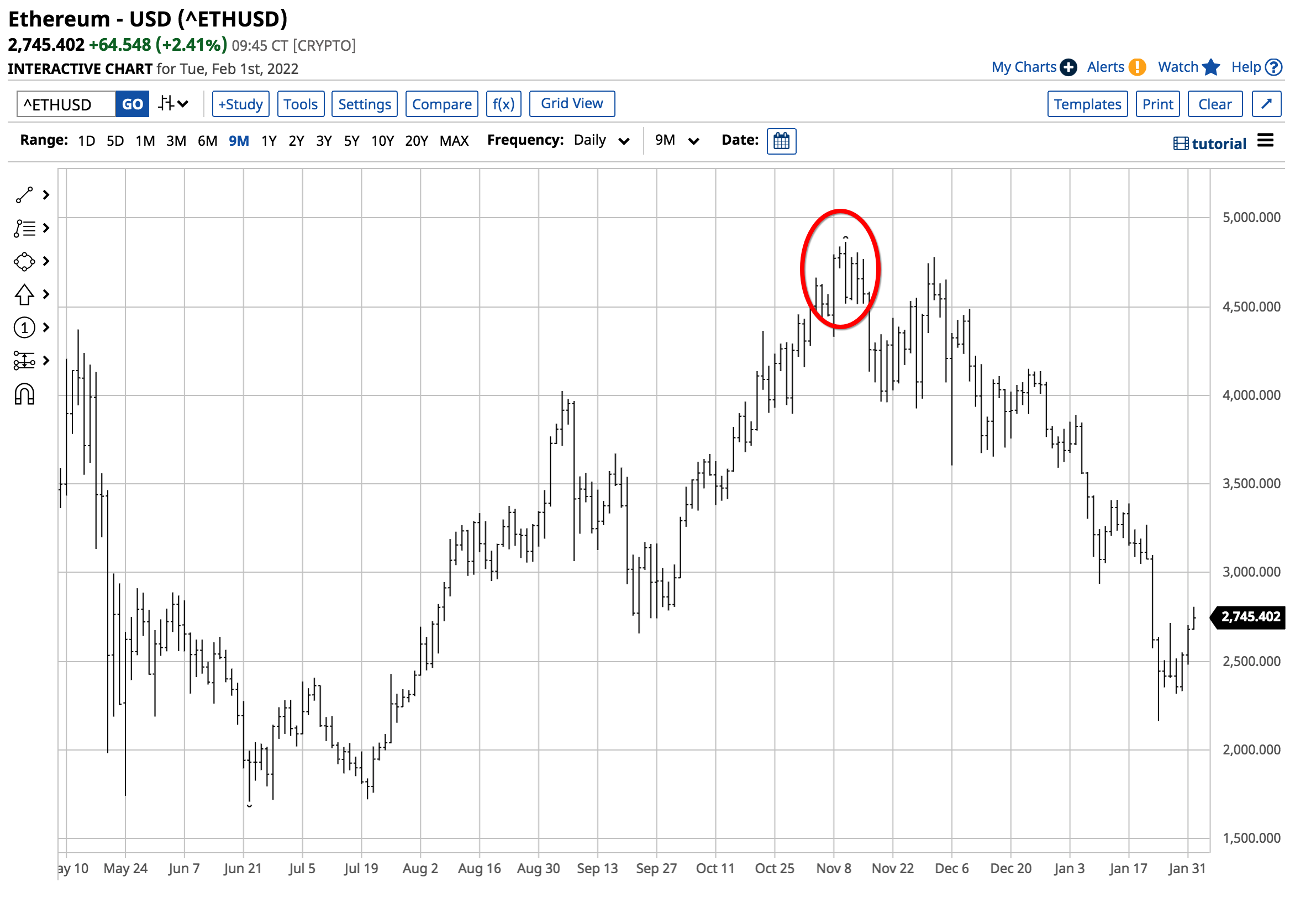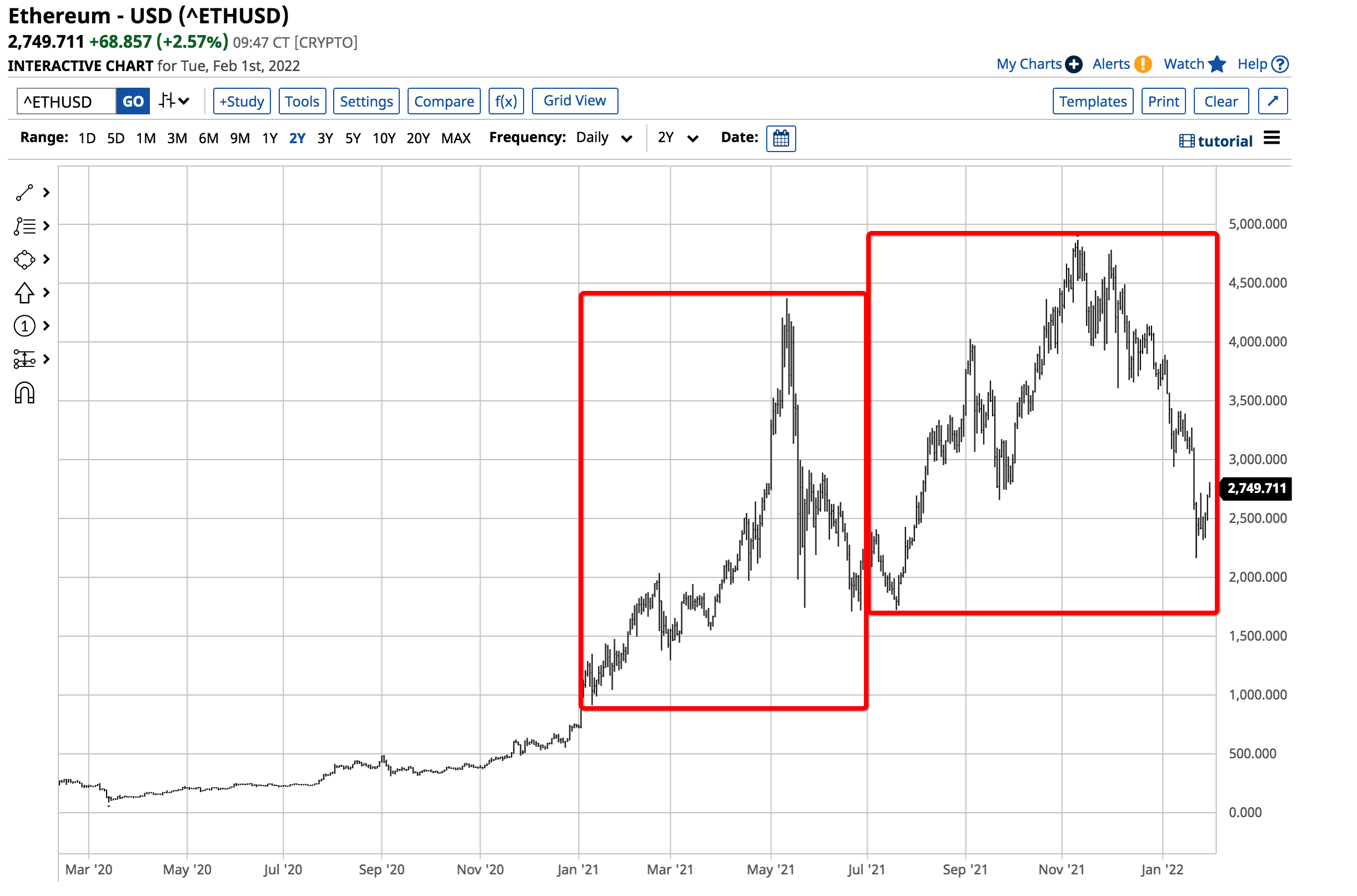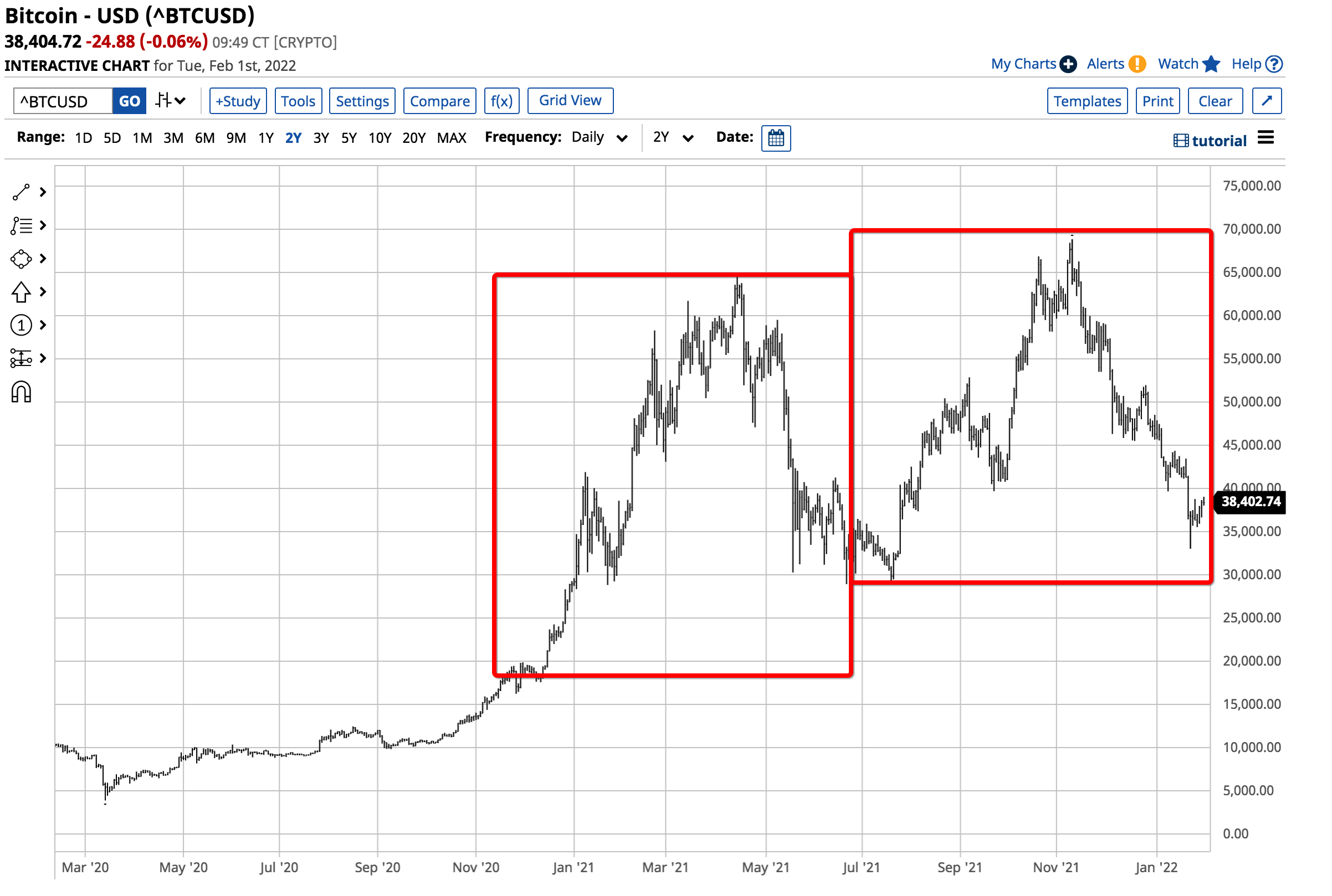This article was written exclusively for Investing.com
- Value Proposition #1: Substantial correction offers better entry for those who loved cryptos on Nov. 10
- Value Proposition #2: Buying dips has been the optimal approach
- Value Proposition #3: Fiat currencies not what they used to be
- Carnage Scenario #1: Russia, China and other countries want cryptos to disappear
- Carnage Scenario #2: Risk-off conditions make speculators gun-shy
Plato, the ancient Greek philosopher, said: “Beauty lies in the eyes of the beholder because the sense of beauty is itself transient in nature.”
Value investing is similar, as an asset’s worth can differ depending on individual perceptions. A recent example is shares of China's internet giant Alibaba (NYSE:BABA). While the overall market views Chinese stocks as highly risky, limiting their value, Warren Buffett associate, value-seeking investor Charlie Munger, has accumulated BABA shares hand over fist.
Munger, who is vice chair of Berkshire Hathaway (NYSE:BRKa), sees value in the Chinese company, while many investors have rejected BABA because of an array of unknown factors surrounding the Chinese government. However, Munger’s judgement that BABA stock offers value comes from his cash flow analysis and other empirical factors.
In the world of cryptocurrencies—which Munger has characterized as disgusting and an affront to civilization—there is no fundamental analysis. Cryptocurrencies move higher or lower on bids and offers in the market. Those bids and offers reflect the sentiment supporting or rejecting the asset class’s value proposition.
The volatility in Bitcoin, Ethereum and the other more than 17,260 cryptocurrencies is a function of the belief that they are superior or inferior to fiat currencies. While cryptos are the embodiment of the evolution of the fintech revolution, they are also a barometer of the desire to return control of the money supply to individuals and remove it from the hands of governments, central banks and monetary authorities.
This epic financial battle has led to wide price variance, pushing digital currency prices to lofty levels when sentiment embraces their value, and brutal declines when that is rejected.
In 2021, there were two periods where prices rose as the value proposition took center stage and two periods of carnage, where sentiment eroded value.
In early 2022, we are in a carnage phase, as Bitcoin, Ethereum and many other cryptocurrencies search for bottoms.
Value Proposition #1: Substantial Correction Offers Better Entry For Those Who Loved Cryptos On Nov. 10
Any market participant who believed in cryptocurrencies’ future as a mainstream asset on Nov. 10 has to love them at lower prices. The market sent an unambiguous signal that another in a long series of corrections was coming after a host of digital tokens moved to new record highs.

Source: Barchart
The chart shows the leading cryptocurrency by market cap, Bitcoin, reached a high of $68,906.48 on Nov. 10 before closing the session at $64,246.65 per token, below the previous day’s low.

Source: Barchart
Ethereum, the second-leading crypto, reached $4,865.426 on Nov. 10 before closing the session at $4,553.094, below the prior day’s low as well.
A key reversal is a one-day trading pattern that can signal the about-face of a trend. Bitcoin and Ethereum put in bearish key reversal patterns on Nov. 10 before following through on the downside. The extreme volatility in the asset class caused the leading cryptos to see their value cut by more than half at the most recent lows.
Anyone who liked the ideological and practical cases for Bitcoin and Ethereum in mid-November has to love them at almost half the price in early February.
Value Proposition #2: Buying Dips Has Been The Optimal Approach
Volatility is a blessing and a curse. Extreme price variance can be a nightmare for static investors, but it creates many opportunities for dynamic traders. Explosive rallies and implosive corrections are nothing new in the cryptocurrency arena. However, when they occur, they can be frightening. From 2021 through early 2022 we have seen two incredible rallies and two scary corrections in Ethereum and Bitcoin.

Source: Barchart
The chart shows that Ethereum has experienced a pair of wide price swings since the end of 2020. The pattern of higher lows and higher highs indicates a bullish price trend.
Ethereum needs to hold above the $1,700 level to keep the trend intact. At the $2,673.50 level at time of writing on Feb. 3, the price was substantially above that after falling to a low of $2,163.316 on Jan. 24.

Source: Barchart
The Bitcoin chart shows the same pattern. Critical technical support for the leading cryptocurrency stands at around $28,900 per token to keep the bullish pattern intact. Since at the time of writing it's trading at the $37,000 level, the price remains significantly above that position.
Still, over the longer term, Bitcoin and Ethereum have experienced many explosive and implosive moves, ultimately leading to new record highs. No matter how scary, buying on price weakness has been the optimal approach to the asset class.
While Charlie Munger's colleague Warren Buffett is also not a crypto supporter, and has called the asset class “financial rat poison squared,” his investment advice about all markets reflects the trading pattern in cryptocurrencies. The Oracle of Omaha once said it is wise for investors to be “fearful when others are greedy, and greedy when others are fearful.” Early February 2022 continues to be a fearful period for the cryptocurrency asset class.
Value Proposition #3: Fiat Currencies Not What They Used To Be
The ideological attraction of cryptocurrencies is that they are a means of exchange, but not fiat currencies. The U.S. dollar, euro, pound, yen, Chinese yuan and other currencies in the global financial system derive value from the full faith and credit of the governments that issue the legal tender. Governments manipulate the currency markets to achieve stability.
Following currency markets is a mirage as the market tends to measure values of one currency versus another. The U.S. dollar has been rallying, with the Dollar Index rising to its highest level since July 2020 last week. The prospects for higher U.S. interest rates have lifted the dollar’s value versus other world currencies as interest rate differentials are a primary factor in the path of least resistance for foreign exchange values.
Meanwhile, measuring the U.S. dollar and other fiat currencies against other assets reveals another story. The tidal wave of central bank liquidity and tsunami of government stimulus during the global pandemic lit an inflationary fuse that erodes all fiat currency values. As the faith and credit in governments declines, cryptocurrencies offer an alternative.
Their ascent over the past years is a barometer of falling confidence and credit deterioration. Crypto values come solely from bids and offers to buy and sell in the marketplace, without central bank or government interference. The ideological case reflects a libertarian political orientation. As fiat currencies decline, crypto’s value proposition improves.
Carnage Scenario #1: Russia, China And Other Countries Want Cryptos To Disappear
Cryptocurrencies periodically implode. The ideological issue that supports their ascent is also a factor that could lead to their demise.
Governments worldwide control citizens through the laws enforced by the military and local authorities. They also control the supply of money.
Any parent knows that the best route for monitoring and controlling a teenager is via access to cash. Governments operate similarly, as controlling the purse strings via the money supply is a crucial component of power. Cryptos challenge that power.
China and Russia are not fond of cryptocurrencies and have banned trading and investing in the asset class. However, the Chinese government embraces blockchain technology and is in the final stages of rolling out a digital yuan.
However, in the U.S. and EU, governments move at a snail’s pace. Government and central bank officials in Washington and Frankfurt continue to express concerns about the illegal uses of cryptos and the future “systemic” risks they may pose. The genuine concern though is that cryptocurrencies challenge their control of the money supply and power.
Governments will slowly move to roll out digital currencies, while likely tightening regulations on the crypto arena as they embrace the evolution of the fintech revolution. Indeed, hedge fund manager Ray Dalio correctly said governments have the power to “kill” cryptos.
Carnage Scenario #2: Risk-Off Conditions Make Speculators Gun-Shy
Cryptocurrencies are going through the fear phase after halving in value since the Nov. 10 peak, the height of the most recent speculative frenzy. One of the risks facing the crypto asset class in early February is the potential continuation of selling in the U.S. stock market and other asset classes.
As the U.S. Federal Reserve tightens monetary policy and geopolitical tensions rise, the equity market tumbled. The possibility for a severe correction—leading to a risk-off period across all asset classes—could push cryptocurrencies even lower.
Bullish and bearish trends often take asset prices to levels that defy logic, reason and rational analysis. Plus, it's challenging to identify fundamentals in the cryptocurrency arena, making them highly susceptible to continued price carnage during a risk-off period as speculators liquidate all risk positions and hide in haven assets like the U.S. dollar, bonds and other historical stores of value.
The fintech revolution will continue to challenge the status quo in finance even as governments, central banks and financial institutions remain behind the curve. Though cryptocurrencies could be a motivational force for them to embrace the revolution, its ideological underpinnings rejecting government control make for an epic battle between the burgeoning asset class and traditional macro and microeconomic assumptions and methods.
I view cryptocurrencies as a barometer of investor faith and trust in governments. Bitcoin may have halved in value since Nov. 10, but at the over $37,000-per-token level, it's a far cry from the five-cent level it traded at a dozen short years ago.
Value or carnage is a personal decision for market participants. The historical trading patterns suggest that at current prices, cryptos offer value. Ironically, the fear of carnage could also help fuel a digital token recovery, if prices go even lower, providing additional value for crypto enthusiasts.
